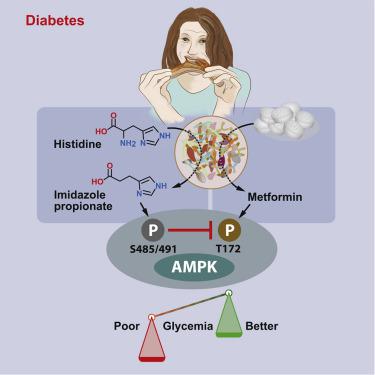Cell Metabolism ( IF 29.0 ) Pub Date : 2020-08-11 , DOI: 10.1016/j.cmet.2020.07.012 Ara Koh 1 , Louise Mannerås-Holm 2 , Na-Oh Yunn 3 , Peter M Nilsson 4 , Sung Ho Ryu 3 , Antonio Molinaro 2 , Rosie Perkins 2 , J Gustav Smith 5 , Fredrik Bäckhed 6

|
Metformin is the first-line therapy for type 2 diabetes, but there are large inter-individual variations in responses to this drug. Its mechanism of action is not fully understood, but activation of AMP-activated protein kinase (AMPK) and changes in the gut microbiota appear to be important. The inhibitory role of microbial metabolites on metformin action has not previously been investigated. Here, we show that concentrations of the microbial metabolite imidazole propionate are higher in subjects with type 2 diabetes taking metformin who have high blood glucose. We also show that metformin-induced glucose lowering is not observed in mice pretreated with imidazole propionate. Furthermore, we demonstrate that imidazole propionate inhibits AMPK activity by inducing inhibitory AMPK phosphorylation, which is dependent on imidazole propionate-induced basal Akt activation. Finally, we identify imidazole propionate-activated p38γ as a novel kinase for Akt and demonstrate that p38γ kinase activity mediates the inhibitory action of imidazole propionate on metformin.
中文翻译:

微生物 Imidazole Propionate 通过 p38γ 依赖性抑制性 AMPK 磷酸化影响对二甲双胍的反应。
二甲双胍是 2 型糖尿病的一线疗法,但对这种药物的反应存在很大的个体差异。其作用机制尚不完全清楚,但 AMP 活化蛋白激酶 (AMPK) 的激活和肠道微生物群的变化似乎很重要。微生物代谢物对二甲双胍作用的抑制作用以前没有研究过。在这里,我们表明,在服用二甲双胍的 2 型糖尿病患者血糖升高时,微生物代谢物丙酸咪唑的浓度更高。我们还表明,在用丙酸咪唑预处理的小鼠中未观察到二甲双胍诱导的葡萄糖降低。此外,我们证明咪唑丙酸酯通过诱导抑制性 AMPK 磷酸化来抑制 AMPK 活性,这取决于丙酸咪唑诱导的基础 Akt 激活。最后,我们将咪唑丙酸酯激活的 p38γ 鉴定为 Akt 的新型激酶,并证明 p38γ 激酶活性介导了丙酸咪唑对二甲双胍的抑制作用。


























 京公网安备 11010802027423号
京公网安备 11010802027423号